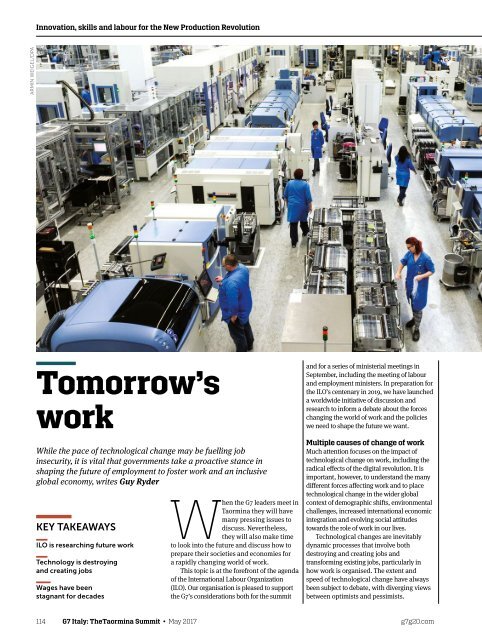G7 Italy-digi
G7 Taormina The 43rd annual Group of Seven (G7) summit, taking place in Taormina in Sicily, Italy, on May 26-27, 2017, will be an unusually important event. Its central participants, time, place, purpose and priorities will inspire it to act on the key issues that cannot be left alone for others later on.
G7 Taormina
The 43rd annual Group of Seven (G7) summit, taking place in Taormina in Sicily, Italy, on May 26-27, 2017, will be an unusually important event. Its central participants, time, place, purpose and priorities will inspire it to act on the key issues that cannot be left alone for others later on.
You also want an ePaper? Increase the reach of your titles
YUMPU automatically turns print PDFs into web optimized ePapers that Google loves.
Innovation, skills and labour for the New Production Revolution<br />
ARMIN WEIGEL/DPA<br />
Tomorrow’s<br />
work<br />
While the pace of technological change may be fuelling job<br />
insecurity, it is vital that governments take a proactive stance in<br />
shaping the future of employment to foster work and an inclusive<br />
global economy, writes Guy Ryder<br />
KEY TAKEAWAYS<br />
ILO is researching future work<br />
Technology is destroying<br />
and creating jobs<br />
Wages have been<br />
stagnant for decades<br />
When the <strong>G7</strong> leaders meet in<br />
Taormina they will have<br />
many pressing issues to<br />
discuss. Nevertheless,<br />
they will also make time<br />
to look into the future and discuss how to<br />
prepare their societies and economies for<br />
a rapidly changing world of work.<br />
This topic is at the forefront of the agenda<br />
of the International Labour Organization<br />
(ILO). Our organisation is pleased to support<br />
the <strong>G7</strong>’s considerations both for the summit<br />
and for a series of ministerial meetings in<br />
September, including the meeting of labour<br />
and employment ministers. In preparation for<br />
the ILO’s centenary in 2019, we have launched<br />
a worldwide initiative of discussion and<br />
research to inform a debate about the forces<br />
changing the world of work and the policies<br />
we need to shape the future we want.<br />
Multiple causes of change of work<br />
Much attention focuses on the impact of<br />
technological change on work, including the<br />
radical effects of the <strong>digi</strong>tal revolution. It is<br />
important, however, to understand the many<br />
different forces affecting work and to place<br />
technological change in the wider global<br />
context of demographic shifts, environmental<br />
challenges, increased international economic<br />
integration and evolving social attitudes<br />
towards the role of work in our lives.<br />
Technological changes are inevitably<br />
dynamic processes that involve both<br />
destroying and creating jobs and<br />
transforming existing jobs, particularly in<br />
how work is organised. The extent and<br />
speed of technological change have always<br />
been subject to debate, with diverging views<br />
between optimists and pessimists.<br />
114 <strong>G7</strong> <strong>Italy</strong>: TheTaormina Summit • May 2017 g7g20.com
















